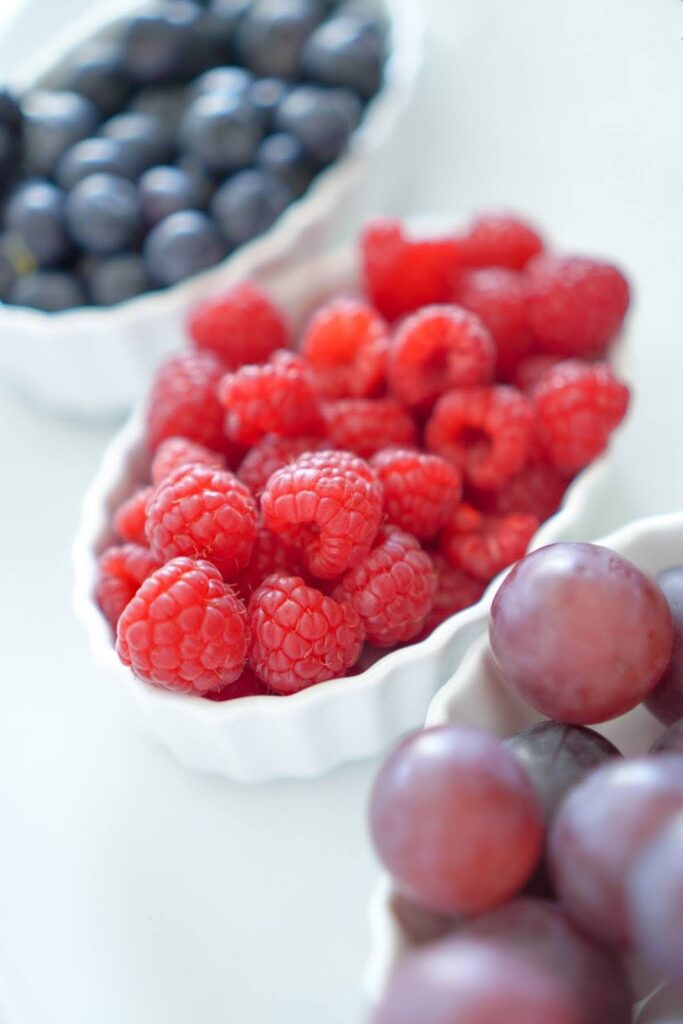Registered dietitian, functional nutritionist, & your new fertility BFF. I'm passionate about helping women thrive during preconception, pregnancy, and postpartum.
Nutrition
PCOS
Fertility
View All
Explore the blog
Hi, I'm Anabelle
Non-toxic Living
Work with our team
Boost Your Fertility with Antioxidants: The Hidden Key to Success
The Science Between Antioxidants and Reproductive Health
Antioxidants are molecules that neutralize harmful free radicals in your body. Free radicals are unstable atoms that can damage cells, leading to oxidative stress. This oxidative stress is believed to impact health negatively, including your reproductive health. Scientific studies have increasingly explored the role of antioxidants in fertility, with many findings suggesting a positive impact.
Antioxidants are known to combat oxidative stress, which can damage cells, including sperm and egg cells. By neutralizing free radicals, antioxidants help maintain cellular integrity and function, which is crucial for reproductive health. One notable study published in the journal ‘Fertility and Sterility’ found that men who took antioxidant supplements experienced improvements in sperm quality, including increased motility and reduced DNA fragmentation. This suggests that antioxidants can enhance male fertility by protecting sperm from oxidative damage.
The relationship between antioxidants and reproductive health is rooted in the protective role antioxidants play. By neutralizing free radicals, antioxidants help maintain the integrity of your cells, including sperm and egg cells. Reducing oxidative stress can result in better quality eggs, enhanced sperm function, and an overall improved environment for conception.
Consider antioxidants as a form of cellular defense. When your body has an adequate supply, it can combat oxidative damage more effectively. This is particularly beneficial for your reproductive system, where cell quality is crucial for successful fertilization and a healthy pregnancy.
Research supports this connection. Studies have shown that higher serum concentrations of antioxidants correlate with better reproductive outcomes. In women, antioxidants support healthy steroidogenesis, the process by which sex steroids are produced, essential for ovulation and menstrual cycle regulation. In men, antioxidants improve sperm quality, motility, and overall fertility.
Moreover, specific antioxidants have been identified as instrumental in fertility. Vitamins C and E, beta-carotene, and selenium are just a few that have been extensively studied. They help in reducing oxidative stress and improving the health of reproductive cells. Knowing this, incorporating antioxidant-rich foods into your daily diet can be a strategic move for enhancing your reproductive health.
How Do Antioxidants Improve Fertility?

Antioxidants work their magic by directly combating oxidative stress (OS), a condition characterized by an imbalance between free radicals and antioxidants in your body. Free radicals are unstable molecules that can damage cells, including the delicate cells involved in reproduction. By neutralizing these free radicals, antioxidants protect your eggs and sperm from oxidative damage.
When oxidative stress is reduced, the quality of both eggs and sperm can improve significantly. For women, this means healthier eggs that are more likely to result in successful fertilization, embryo quality, and ultimately, a viable pregnancy. Improved egg quality is especially critical for those dealing with age-related fertility challenges or conditions like polycystic ovary syndrome (PCOS).
On the male side, antioxidants play an equally crucial role. They help enhance sperm quality by improving motility, morphology, and overall DNA integrity. Healthier sperm increases the chances of successful fertilization and reduces the risk of miscarriage and genetic abnormalities.
Additionally, antioxidants can support the overall environment of your reproductive system, contributing to better ovarian function and uterine health. This balanced environment is crucial for conception and maintaining a healthy pregnancy. Thus, whether you’re trying to conceive naturally or with the assistance of IVF or ICSI, incorporating antioxidants into your routine can be a powerful ally in your fertility journey.
What Causes Oxidative Stress?
Oxidative stress is a condition that arises when there’s an imbalance between free radicals, specifically reactive oxygen species (ROS), and the body’s ability to neutralize them with antioxidants. It’s like a tug-of-war happening in your cells, and when the scales tip in favor of ROS, the result is oxidative damage.
This oxidative damage can affect various parts of your body, but when it comes to fertility, both male and female reproductive health can take a hit. Let’s dive into some common causes. First off, poor lifestyle choices such as a lack of regular exercise, overeating, or a diet rich in sugars and unhealthy fats are significant contributors. These habits increase ROS levels while depleting your antioxidant reserves, creating a fertile ground for oxidative stress.
Environmental factors also play a crucial role. Exposure to pollutants, toxins, and radiation can ramp up ROS production. Then there’s the unavoidable factor of aging. As we age, our body’s cellular energy production decreases, and we’re naturally more prone to oxidative stress.
Not to be overlooked, physical and emotional stress can trigger oxidative stress as well. Chronic stress encourages the production of ROS, leading to cellular damage and decreasing your body’s capacity to fend off these unwelcome molecules.
Understanding these causes helps you take proactive steps to mitigate oxidative stress, ultimately creating a better environment for reproductive health. Now, let’s explore how antioxidants step in to level the playing field.
Key Antioxidants That Boost Fertility

Okay, now that we know that we want LESS oxidative stress and MORE antioxidants – how do we actually do that?
First, focus on incorporating antioxidant-rich foods into your daily diet. These foods are not only delicious but can also help boost your fertility. Think colorful fruits and vegetables, nuts, seeds, and whole grains. Berries, spinach, and dark chocolate are all excellent choices packed with antioxidants to help fight oxidative stress.
In addition to a diverse diet, consider omega-3 fatty acids, which have been shown to reduce prostanoids and increase antioxidant effects. You can find these in fatty fish like salmon, as well as in flaxseeds and walnuts. Not only do these foods help balance your antioxidant levels, but they also add variety and flavor to your meals.
Don’t forget about lifestyle factors! Regular physical activity can enhance your body’s ability to manage oxidative stress. Likewise, stress-reduction techniques such as meditation, yoga, or even simple daily walks can have a positive impact on your oxidative balance.
Finally, avoid exposure to toxins as much as possible. This includes reducing your intake of processed foods, quitting smoking, limiting alcohol consumption, and avoiding areas with high pollution. These changes might seem challenging, but they’re essential steps toward decreasing oxidative stress and creating a fertile environment. Antioxidants help combat oxidative stress, which can damage reproductive cells.
By taking these steps, you’ll be on your way to a healthier, more balanced body, primed for fertility. Remember, while it might take some time to see the effects, every small change counts.
Top Antioxidant-Rich Foods for Fertility
When it comes to enhancing your fertility through diet, loading up on antioxidant-rich foods is crucial. These foods combat oxidative stress, protect your eggs and sperm, and provide a fertile foundation for conception. Eating a diverse range of fruits and vegetables is an excellent way to ensure you’re getting the antioxidants you need.
Here are some top choices to consider:
- Berries: Blueberries, strawberries, raspberries, and blackberries are bursting with antioxidants and vitamins that support reproductive health.
- Leafy green vegetables: Spinach, kale, and Swiss chard are not only packed with antioxidants but also loaded with folate, which is essential for healthy fetal development.
- Citrus fruits: Oranges, grapefruits, lemons, and limes are excellent sources of vitamin C, a powerful antioxidant that can enhance the quality of both eggs and sperm.
- Nuts and seeds: Almonds, walnuts, and sunflower seeds are high in vitamin E, which helps protect sperm and egg DNA from damage.
- Colorful vegetables: Vegetables like carrots, sweet potatoes, and bell peppers contain beta-carotene, an antioxidant that converts to vitamin A in the body, supporting hormonal health.
- Tomatoes: Rich in lycopene, tomatoes can improve sperm quality and reduce the risk of oxidative stress.
Incorporating these foods into your daily diet can create a positive impact on your fertility. Remember, balance and variety are key. Aim to fill your plate with a rainbow of colors to maximize the benefits of different antioxidants.
| Antioxidant | Natural Sources | Impact on Fertility |
| Vitamin C | Citrus fruits, strawberries, bell peppers | Improves sperm quality, reduces oxidative DNA damage |
| Vitamin E | Nuts, seeds, leafy greens | Enhances endometrial lining, crucial for implantation |
| Coenzyme Q10 | Meat, fish, whole grains | Improves ovarian response, boosts egg quality |
| Selenium | Brazil nuts, seafood, eggs | Protects sperm from oxidative damage, supports reproductive health |
| Zinc | Oysters, beef, spinach | Essential for hormone regulation, improves sperm formation |
Incorporating antioxidant-rich foods into your diet can significantly enhance both male and female fertility by reducing oxidative stress and improving reproductive health. These vital nutrients work to protect and improve egg and sperm quality, support hormone regulation, and create a more favorable environment for conception. By understanding and utilizing the power of antioxidants, you’re taking a proactive step towards boosting your fertility and optimizing your chances of a successful pregnancy.
Looking for More Support on Your Fertility Journey?
You can apply for a free strategy call to see which program would be the best for you. Our team of dedicated fertility practitioners will help you gain answers, clarity, and a roadmap to naturally enhance your fertility using science-backed methods and a food as medicine approach.
Leave a Reply Cancel reply
The Preconception Playbook
This free playbook provides specific actionable tips to get started on your fertility journey, as well as what to avoid while you're trying to conceive.
Get the free playbook
Functional nutrition for women & couples trying to conceive
Get the Preconception Playbook
Actionable tips to get started on your fertility journey, as well as what to avoid while you're trying to conceive.
Be the first to comment